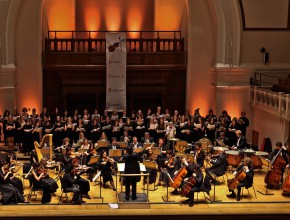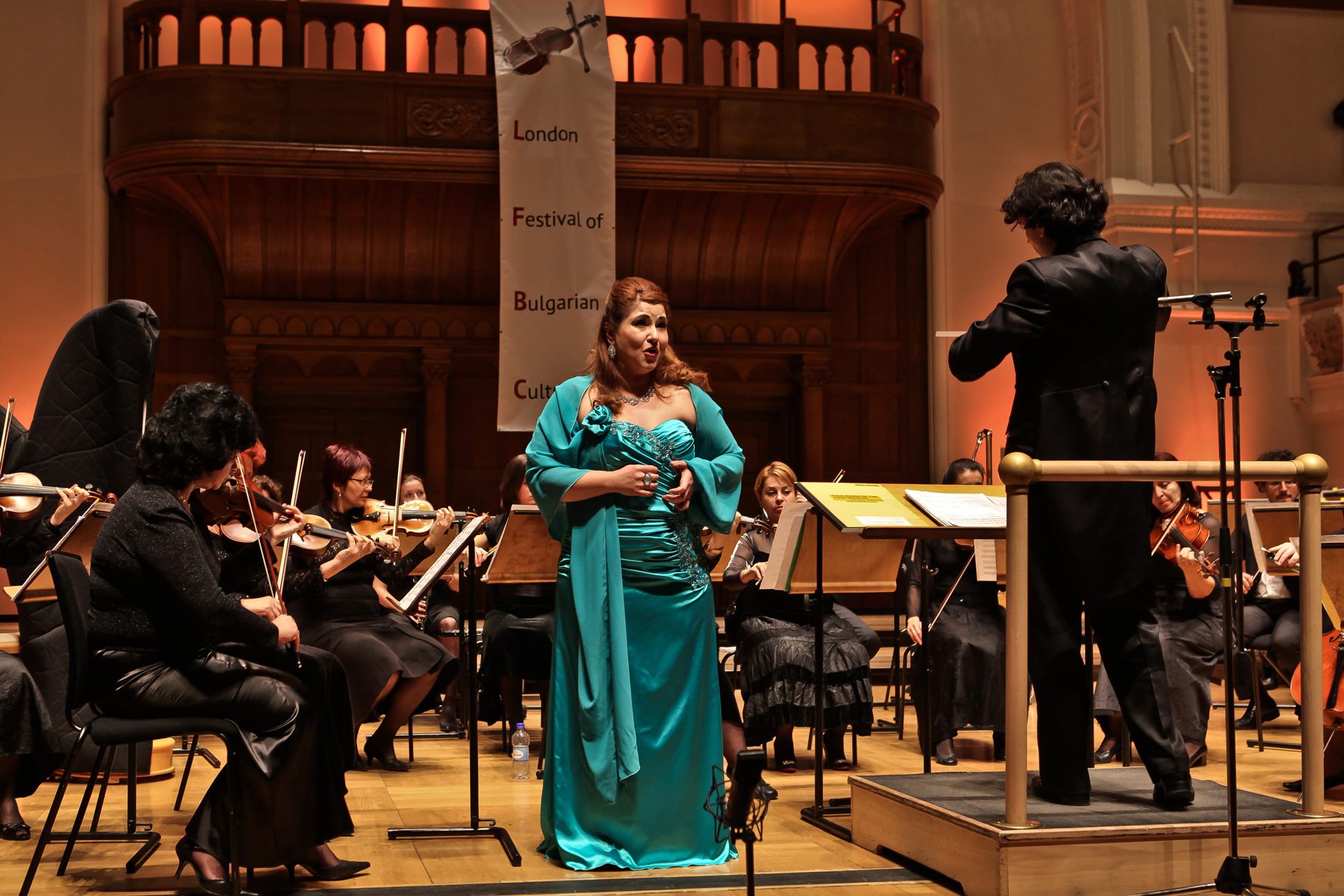
03.11.2012. Martin Georgiev conducted the opening concert of the 2nd London Festival of Bulgarian Culture (LFBC) at Cadogan Hall, London, with the Varna Symphony Orchestra, from Georgiev’s native city of Varna (home to the oldest international ballet competition in the world and the oldest golden treasure ever found.) The concert, titled Bulgarian & British Symphonic Folk Songs featured a number of UK premieres by some of the most significant Bulgarian composers of the early and the late 20th Century, alongside Vaughan Williams’ magnificent last cantata, Folksongs of the Four Seasons featuring the Paulina Voices and the Holst Choir from London – both choirs been taught and directed by Vaughn Williams himself in his lifetime. All compositions that Georgiev programmed in the concert were inspired by Folk Songs and Sacred Chants and Carols, from Bulgaria and Britain, drawing fascinating parallels. You could read more about the works and their composers in the concert programme (here), and below are some videos from the concert, with just a few words about each composer. London Festival of Bulgarian Culture was founded in 2011 by virtuoso violinist and producer Ivo Stankov who is the director and producer of the festival which aims to share the hidden treasures of Bulgarian culture with the British public.
Paulina Voices and the Holst Choir from London – both choirs been taught and directed by Vaughn Williams himself in his lifetime. All compositions that Georgiev programmed in the concert were inspired by Folk Songs and Sacred Chants and Carols, from Bulgaria and Britain, drawing fascinating parallels. You could read more about the works and their composers in the concert programme (here), and below are some videos from the concert, with just a few words about each composer. London Festival of Bulgarian Culture was founded in 2011 by virtuoso violinist and producer Ivo Stankov who is the director and producer of the festival which aims to share the hidden treasures of Bulgarian culture with the British public.
More about the composers in the programme and their works: conductor, Martin Georgiev presents his choice of music,
with videos from the concert:
|
|


 Pancho Vladigerov (1899-1978) had the first Berlin Philharmonic premiere of his work at the age of 20; appeared with that orchestra again a year later playing his own First Piano Concerto, and signed a publishing contract with Universal Edition only two years later. A composer who’s works have been performed by the Vienna Philharmonic, LSO, Philadelphia Orchestra, Moscow Philharmonic, David Oystrakh, Alexis Weissenberg (who was also a piano pupil of Vladigerov’s) and many others in the first half of the 20th Century, and about whom most non-Bulgarians have never heard before today, unfortunately, is something that should be provoking at least a curiosity, in my humble opinion. We performed one of his smaller-scale works, which was originally composed as a solo piano cycle in 1934 and later orchestrated by the composer himself – the Shumen Miniatures, named after the town of his childhood and youth – Shumen (which also happens to be in close vicinity to Varna :). Here follow videos with a few movements from that cycle, recorded at our LFBC concert.
Pancho Vladigerov (1899-1978) had the first Berlin Philharmonic premiere of his work at the age of 20; appeared with that orchestra again a year later playing his own First Piano Concerto, and signed a publishing contract with Universal Edition only two years later. A composer who’s works have been performed by the Vienna Philharmonic, LSO, Philadelphia Orchestra, Moscow Philharmonic, David Oystrakh, Alexis Weissenberg (who was also a piano pupil of Vladigerov’s) and many others in the first half of the 20th Century, and about whom most non-Bulgarians have never heard before today, unfortunately, is something that should be provoking at least a curiosity, in my humble opinion. We performed one of his smaller-scale works, which was originally composed as a solo piano cycle in 1934 and later orchestrated by the composer himself – the Shumen Miniatures, named after the town of his childhood and youth – Shumen (which also happens to be in close vicinity to Varna :). Here follow videos with a few movements from that cycle, recorded at our LFBC concert. f of the 20th century, an outstanding artist who faced a strong totalitarian opposition to his avant-guard style of composition, but nevertheless toured the world with the Sofia Soloists chamber ensemble, a conductor who gave a stunning number of world premieres and recordings of new works, and taught not one or two rising stars on an international level (e.g. Yordan Kamdzhalov, Rossen Milanov, Rossen Gergov, and I wouldn’t put myself amongst the stars, but amongst Kazandjiev’s students – certainly 🙂 and a composer who created some of the most remarkable modern compositions that I know, and who was described by Shostakovich as “magnificent”, is perhaps sadly unnoticed in the west today, seemingly because of the isolation that he had to endure as a composer from the other side of the iron curtain and not from one of the largest and most powerful states…
f of the 20th century, an outstanding artist who faced a strong totalitarian opposition to his avant-guard style of composition, but nevertheless toured the world with the Sofia Soloists chamber ensemble, a conductor who gave a stunning number of world premieres and recordings of new works, and taught not one or two rising stars on an international level (e.g. Yordan Kamdzhalov, Rossen Milanov, Rossen Gergov, and I wouldn’t put myself amongst the stars, but amongst Kazandjiev’s students – certainly 🙂 and a composer who created some of the most remarkable modern compositions that I know, and who was described by Shostakovich as “magnificent”, is perhaps sadly unnoticed in the west today, seemingly because of the isolation that he had to endure as a composer from the other side of the iron curtain and not from one of the largest and most powerful states…
 Dimitar Nenov (1901-1953) was a remarkable composer and a prominent architect, founder of the Sofia Radio Orchestra, later Bulgarian National Radio Orchestra (1935), and of the music department of the Bulgarian National Radio as its first music curator/director. He faced persecution and ridicule during the Communist regime, and his heritage was subjected to deliberate obliteration after his early death. Nonetheless, his compositions are considered today amongst the most prominent masterpieces of Bulgarian music, while abroad he is still unknown, although he was educated in Germany, toured across Europe as a virtuoso pianist, and recorded in such capacity in Germany and Hungary.
Dimitar Nenov (1901-1953) was a remarkable composer and a prominent architect, founder of the Sofia Radio Orchestra, later Bulgarian National Radio Orchestra (1935), and of the music department of the Bulgarian National Radio as its first music curator/director. He faced persecution and ridicule during the Communist regime, and his heritage was subjected to deliberate obliteration after his early death. Nonetheless, his compositions are considered today amongst the most prominent masterpieces of Bulgarian music, while abroad he is still unknown, although he was educated in Germany, toured across Europe as a virtuoso pianist, and recorded in such capacity in Germany and Hungary. ate further in writing, but rather leave them to your contemplation. I offer below 5 videos from our performance of
ate further in writing, but rather leave them to your contemplation. I offer below 5 videos from our performance of 
